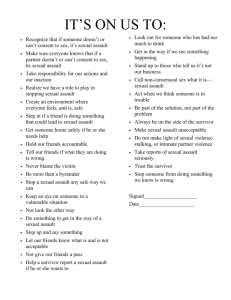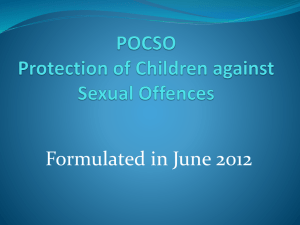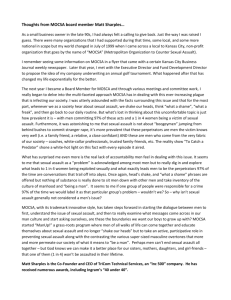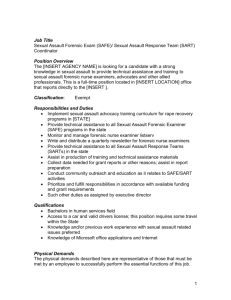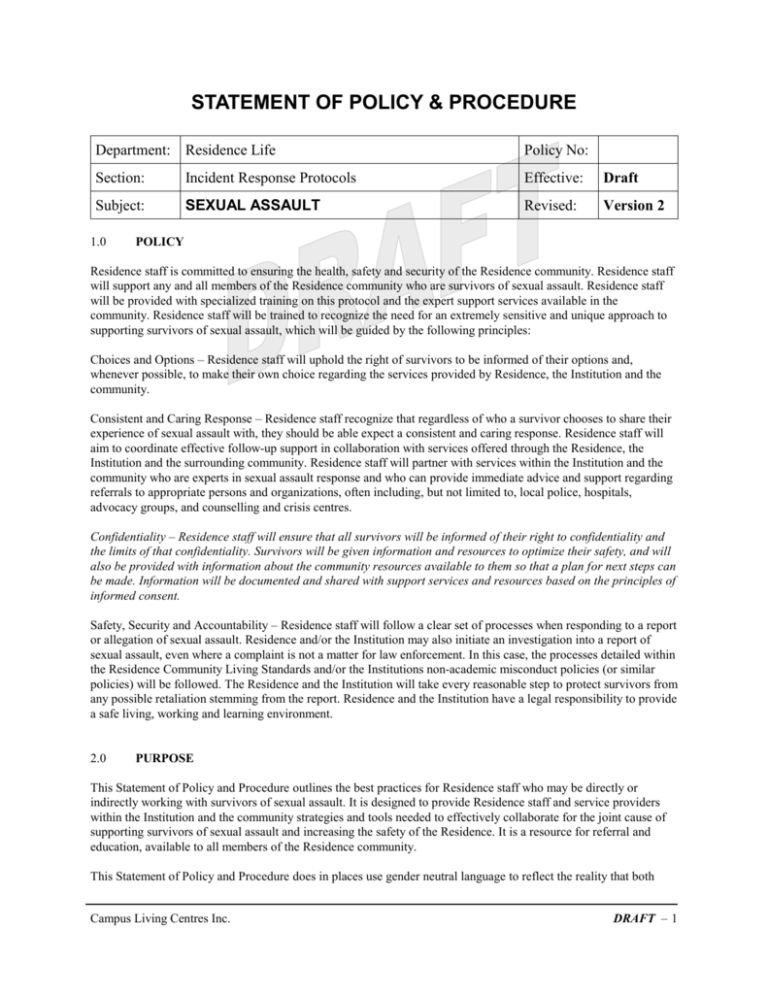
STATEMENT OF POLICY & PROCEDURE
Department: Residence Life
Policy No:
Section:
Incident Response Protocols
Effective:
Draft
Subject:
SEXUAL ASSAULT
Revised:
Version 2
1.0
POLICY
Residence staff is committed to ensuring the health, safety and security of the Residence community. Residence staff
will support any and all members of the Residence community who are survivors of sexual assault. Residence staff
will be provided with specialized training on this protocol and the expert support services available in the
community. Residence staff will be trained to recognize the need for an extremely sensitive and unique approach to
supporting survivors of sexual assault, which will be guided by the following principles:
Choices and Options – Residence staff will uphold the right of survivors to be informed of their options and,
whenever possible, to make their own choice regarding the services provided by Residence, the Institution and the
community.
Consistent and Caring Response – Residence staff recognize that regardless of who a survivor chooses to share their
experience of sexual assault with, they should be able expect a consistent and caring response. Residence staff will
aim to coordinate effective follow-up support in collaboration with services offered through the Residence, the
Institution and the surrounding community. Residence staff will partner with services within the Institution and the
community who are experts in sexual assault response and who can provide immediate advice and support regarding
referrals to appropriate persons and organizations, often including, but not limited to, local police, hospitals,
advocacy groups, and counselling and crisis centres.
Confidentiality – Residence staff will ensure that all survivors will be informed of their right to confidentiality and
the limits of that confidentiality. Survivors will be given information and resources to optimize their safety, and will
also be provided with information about the community resources available to them so that a plan for next steps can
be made. Information will be documented and shared with support services and resources based on the principles of
informed consent.
Safety, Security and Accountability – Residence staff will follow a clear set of processes when responding to a report
or allegation of sexual assault. Residence and/or the Institution may also initiate an investigation into a report of
sexual assault, even where a complaint is not a matter for law enforcement. In this case, the processes detailed within
the Residence Community Living Standards and/or the Institutions non-academic misconduct policies (or similar
policies) will be followed. The Residence and the Institution will take every reasonable step to protect survivors from
any possible retaliation stemming from the report. Residence and the Institution have a legal responsibility to provide
a safe living, working and learning environment.
2.0
PURPOSE
This Statement of Policy and Procedure outlines the best practices for Residence staff who may be directly or
indirectly working with survivors of sexual assault. It is designed to provide Residence staff and service providers
within the Institution and the community strategies and tools needed to effectively collaborate for the joint cause of
supporting survivors of sexual assault and increasing the safety of the Residence. It is a resource for referral and
education, available to all members of the Residence community.
This Statement of Policy and Procedure does in places use gender neutral language to reflect the reality that both
Campus Living Centres Inc.
DRAFT – 1
women and men may be survivors of sexual assault. In other places the language is gender specific to reflect the
nature of the services provided and to recognize the reality that women are more at risk of sexual violence. It is not
intended to diminish the male experience of violence.
3.0
SCOPE
This Statement of Policy and Procedure applies to all Residence staff members, however, significant efforts will be
made to educate all members of the Residence community on this protocol, including students, guests and service
providers within the Institution and surrounding community.
4.0
RESPONSIBILITY
All Residence staff is equally responsible for understanding and adhering to this Statement of Policy and Procedure.
5.0
DEFINITIONS
“Sexual Assault” – any unwanted act of a sexual nature imposed by one person upon another (e.g. kissing, fondling,
oral or anal sex, intercourse, or other forms of penetration). The Centre for Research and Education on Violence
against Women and Children explain sexual assault in the following terms:
“In legal terms, sexual assault occurs when a person touches you in a sexual manner without
your consent. More specifically, sexual assault can involve anything from unwanted touching
of a sexual nature to forced penetration. It is always a violent act that has negative emotional
effects, whether or not there are physical injuries. A sexual assault can also occur when
someone threatens to sexually assault you and has the ability to follow through on that threat
immediately. Sexual assault also includes sexual abuse that happened in the past. Sexual
contact may be illegal in relationships where:
one person is in a position of authority over the other (i.e. doctor)
there is a relationship where one person is dependent on the other (i.e. babysitter)
The penalties for committing these different types of sexual offences vary. Here is how the
Criminal Code describes adult sexual assault. There are three levels:
Sexual assault (level 1) - involves minor physical injuries or no injuries to the victim
Sexual assault (level 2) - involves sexual assault with a weapon, threats or causing
bodily harm
Sexual assault (level 3) - results in wounding, maiming, disfiguring or endangering
the life of the victim” (2008, p. 10).
“Criminal Harassment” and/or “Stalking”– in the Criminal Code, criminal harassment also includes stalking. Stalking
consists of actions that are intended to control a person or make them afraid. It can include the acts of following or
watching them, calling them too many times, showing up at their home, school or work without their permission, or
vandalizing their home or property. The Centre for Research and Education on Violence against Women and
Children define criminal harassment:
“generally consists of repeated conduct that is carried out over a period of time which causes
victims to reasonably fear for their safety but does not necessarily result in physical injury”
(2008, p. 11).
“Sexual Harassment” – any comments or behaviour of a sexual nature that is known, or should be known to be
unwelcome. Sexual harassment can include: comments, jokes, or behaviour that makes an individual feel uneasy;
displaying sexual pictures or drawings; sexual suggestions (or demands) by a person with authority and punishment
Campus Living Centres Inc.
DRAFT – 2
(or threats) if an individual refuses a sexual request. The Centre for Research and Education on Violence against
Women and Children define it as:
“Any sexual or gender related comment or behaviour which has the effect of interfering with
a woman’s dignity as a worker, her work performance or her safety in the workplace. You
can be sexually harassed by an employer, a supervisor, a coworker or any other person
connected with your workplace, including a supplier or a customer. The harassment may take
the form of one comment or behaviour, but is more likely to be experienced as a pattern of
conduct. The behaviour need not be overtly “sexual”, but will be based on gender” (2008, p.
13).
“Power imbalance” and “Positions of power” – natural power imbalances exist in the workplace between employers
and employees, supervisors and workers, teachers and students. In Residence, this same trend exists between
managers and staff, and Resident Advisors and students. If someone in a position of power, trust or authority uses
that position to engage in sexual activity with a person over whom he/she has power, that activity could constitute a
sexual assault. Under the law, the validity of consent to sexual relations is suspect when a power imbalance exists in
that relationship.
“Confidentiality” – refers to the nondisclosure of certain information except to another authorized person. Due to the
particular sensitivity of sexual assault, confidentiality is of the utmost importance and will be maintained at all times.
Confidentiality is vital to the safety of assaulted women and children and to their sense of control over their personal
information. Those involved in dealing with the complaints will disclose information only where absolutely
necessary and the survivor will be consulted before any disclosure of information is made.
“Limits of Confidentiality” – defines what can be held in confidence and what cannot. Confidentiality does not mean
anonymity. In other words, any information that is disclosed by a survivor of sexual assault to Residence staff will
remain confidential and only accessible to other authorized staff of the Residence or Institution. In practice,
Residence staff required to share information “up, but not out.” This means that if a survivor of sexual assault shares
their story with a Residence Advisor, or Front Desk Staff, then those individuals will be required to share that
information with their supervisor, and ultimately the General Manager of the Residence. The General Manager is
also required to notify the Institution of any reports of sexual assault. If the General Manager and/or the Institution
believe that the safety of the residence or campus community is at risk, then this information will be immediately
reported to the Police. If the survivor reports that the individual responsible for the sexual assault is a Residence
student, staff member, or prominent member of the community, then a Residence Incident Report will be filed and an
investigation will commence under the Residence Community Living Standards. A fundamental principle of the
Residence Community Living Standards is that the individual accused of an offense be informed of the all details of
the allegations and who made the allegations, at the earliest possible point in the process.
“Informed Consent” – refers to the permission the survivor provides to another person (Residence staff) to share
specific information about the sexual assault with someone else (likely their supervisor, the Institution or Police). In
order to provide informed consent, the survivor must have a clear appreciation and understanding of the facts, the
limits of confidentiality, and future consequences for this information being shared. The principles of informed
consent require the following be addressed: (a) what specific information is to be disclosed; (b) to whom the
information will be disclosed; (c) for what purposes the information is to be disclosed; (d) any special instructions
the survivor wishes to be included; (e) a time limit; (f) the right to have independent legal counsel; and (e) an
authorizing signature. Whenever possible, a discussion about the limits of confidentiality and informed consent will
occur as early as possible in the process of a survivor making a report of sexual assault. (Reference: GuelphWellington Community Sexual Assault Protocol, 2010)
“Consensual Sexual Activity” – consent is defined as the act of willingly agreeing to engage in specific sexual
behavior. Silence or non-communication is not consent. A person in a state of diminished judgment cannot consent.
Consent requires that a person is able to freely choose between two options: yes and no. A person is incapable of
giving consent if she/he is asleep, unconscious or otherwise unable to communicate. No one who has been threatened
or coerced or drugged can consent. A person is usually unable to give consent when she/he is under the influence of
Campus Living Centres Inc.
DRAFT – 3
alcohol and/or drugs, or has a mental disability. A current or prior sexual or dating relationship does not constitute
consent. A person can withdraw consent at any time during the course of a sexual encounter. Pursuing sexual contact
in any form whatsoever with an unwilling partner is sexual assault. How exactly we know when the person we’re
with is consenting to, or refusing, a sexual advance, can at times be difficult to discern; nevertheless the entire
responsibility for correct discernment is upon the person making the sexual advance.
“Survivor” – anyone who has been a victim of sexual assault.
“Adult” – all survivors of sexual assault over the age of 16 will be treated as an adult and be afforded all of rights
and choices detailed in this protocol.
6.0
REFERENCES & RELATED POLICIES
{list to be generated]
7.0
PROCEDURE
All Residence staff will follow the procedures outlined below in response to a report of sexual assault, ensuring that
regardless of where/when a survivor reports this incident, that they will get a consistent and caring first response.
Ideally, this process should be seamless, with as much assistance provided to that person as possible to ensure they
are able to access the services they choose.
A consistent, caring and effective first response consists of three primary interventions, which are listed below:
1.
2.
3.
Confidentiality and Consent: Residence staff will explain confidentiality, the limits of that confidentiality,
and then obtain informed consent.
Safety and Support: Residence staff will find a safe, private space to listen to the survivor’s story, but only
as much as is needed to understand the nature of the incident and make an assessment of the survivor’s (and
community) level of safety.
Referrals and Follow-up: Residence staff will call management staff for assistance and work together to
make the most appropriate referrals. This may include helping the survivor overcome any potential barriers
limiting their ability to access support, and then providing follow-up support.
8.0
ATTACHMENTS
(a)
Information for students
(b)
Information for staff
(c)
Training for staff
9.0
REVISION CONTROL
Date
Revision
Effective
References, Resources and Training Tools
http://www.womensweb.ca/violence/
http://www.phac-aspc.gc.ca/ncfv-cnivf/femabus-eng.php
http://www.phac-aspc.gc.ca/ncfv-cnivf/publications/rcmp-grc/fem-partnrabus-eng.php
http://www.ualberta.ca/dept/health/public_html3/healthinfo/SACAN.HTM
http://www.statcan.gc.ca/pub/85f0033m/85f0033m2008019-eng.pdf
http://www.ncjrs.gov/pdffiles1/nij/205521.pdf
http://www.sexualassaultsupport.ca/Default.aspx?pageId=537784
http://www.citizenship.gov.on.ca/owd/english/
Campus Living Centres Inc.
DRAFT – 4
MacQuarrie, B. (Ed). (2008). Surviving the system handbook: Advice on using the legal system if you are a survivor
of sexual violence. London, Canada: Centre for Research & Education on Violence against Women and Children.
(http://www.crvawc.ca/documents/Surviving%20the%20System%20Handbook%20-%20August09.pdf )
First Response Checklist:
During a first response, Residence staff should generally do the following:
Introduce themselves
Ask how s/he would prefer to be addressed
Tell the survivor that s/he has the option of having someone present for support
Actively listen to what the survivor has to say in a respectful and non-judgmental manner.
Be emotionally supportive
Treat the survivor with respect and dignity
Be inclusive (to gender, race, age, ability, sexual orientation, culture, socio-economic and religious issues)
Try to make the survivor as comfortable as possible
Allow the survivor control the intervention to the extent that this was possible
Meet with the survivor in a place that is private and safe
Clearly describe the various resources available (and if possible, provide an information sheet about):
Emergency Shelter; Crisis Lines; Hospital medical and support services; Community resources; the option
of reporting the assault to the police.
Identify the potential implications of accepting their services: The limits of confidentiality
Provide the opportunity to ask and have questions answered
Address her physical and medical needs by offering a referral to __ (for medical care assessment,
documentation of injuries and/or forensic services, prevention of sexually transmitted disease, pregnancy
prevention and crisis support) and offered to assist with this referral. In cases of sexual assault, the
survivor’s safety and risk for further harm should also be assessed.
Tell the survivor how to contact you in the future
Consider any barriers that may have an impact on her ability to access service including language, financial
need, disability, transportation, geographic location, culture, age, and sexual orientation. If necessary, help
her to problem solve in addressing these (for example, assisted her in calling or arranging transportation for
her).
Encourage her to find someone she could talk to, whether it be professional counselling services, a friend,
family member, pastor or trusted person in her family, community or faith community.
Understand that a differential response to domestic violence recognizes that the unique characteristics and
dynamics of each situation require an individualized response. A differential approach examines each
situation in its context from a holistic and strength-based approach and does not automatically prescribe
one. It is important for service providers to recognize that many women choose to stay with a partner who
has been abusive. It is the responsibility of each community partner and service provider to be aware of the
community resources and services available. At a minimum, service providers should consider making a
referral to:
Campus Living Centres Inc.
DRAFT – 5

